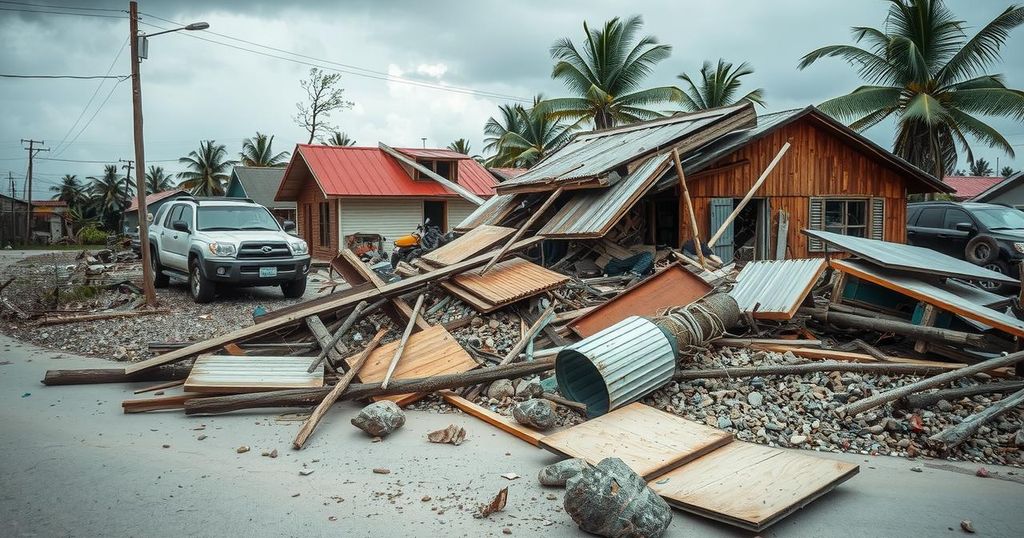Global news
AFRICA, CABO DELGADO, CHI, CHIDO, EMERGENCY RESPONSE, EUROPEAN UNION, HURRICANE BERYL, LUISA MEQUE, MAPUTO, ME, MEQUE, MOZAMBICAN, MOZAMBIQUE, NAMPULA, NATIONAL INSTITUTE FOR DISASTER RISK MANAGEMENT AND REDUCTION, NATIONAL INSTITUTE OF RISK AND DISASTER MANAGEMENT, NATURAL DISASTER, NATURAL DISASTERS, NIASSA, RFI, TETE
Fatima Khan
0 Comments
Cyclone Chido Causes 34 Fatalities and Severe Damage in Mozambique
Cyclone Chido has left at least 34 dead in Mozambique and caused extensive damage, particularly in Cabo Delgado and Nampula provinces. Displacement and infrastructural destruction are significant, with nearly 175,000 people affected. Continuing heavy rains and winds necessitate caution and humanitarian aid, especially for vulnerable groups, highlighting the country’s ongoing challenges with recurrent cyclones.
Cyclone Chido has wreaked havoc in Mozambique, claiming at least 34 lives according to the National Institute of Risk and Disaster Management. The cyclone, which originated as a powerful storm, made landfall in Cabo Delgado province and resulted in significant displacement and destruction of infrastructure, affecting roads and homes. Although Cyclone Chido has weakened, heavy rains and strong winds continue to pose dangers, necessitating heightened caution and aid efforts.
The cyclone first claimed lives in Nampula province, and subsequent reports highlighted fatalities in Niassa province as well. The aftermath leaves approximately 175,000 people impacted and 319 reported injuries. Over 23,600 homes have been damaged, alongside the loss of 170 fishing vessels. The UN’s agencies, such as UNICEF and the European Union humanitarian agency, have underscored the urgent need for assistance as the storm progresses through Mozambique, with risk assessments indicating substantial threats, particularly to children and vulnerable communities.
As Cyclone Chido continues on its path, it poses further challenges for Mozambique, a country already grappling with socio-economic vulnerabilities and impacted by recurrent cyclones. Relief efforts are being mobilized, focusing on health, safety, and essential services as the storm approaches neighboring Malawi and Zimbabwe, further straining regional infrastructure and humanitarian responses.
In light of Cyclone Chido’s destructive toll, authorities are appealing for increased vigilance and a collaborative effort to provide crucial support to affected communities, ensuring that aid reaches those who require it most, particularly children, families, and displaced individuals.
Cyclone Chido represents one of the most devastating natural disasters to strike Mozambique in recent years. The cyclone’s origin can be traced back to its impact on the Indian Ocean island of Mayotte, where it reportedly caused numerous casualties. Mozambique, particularly its northern regions, is prone to cyclones, which are exacerbated by underlying socio-economic challenges, including conflict and developmental deficits. Undoubtedly, these recurring natural events hamper progress and place communities at heightened risk, particularly vulnerable populations such as children.
In conclusion, Cyclone Chido has inflicted substantial casualties and widespread destruction in Mozambique, necessitating urgent humanitarian intervention and support for affected communities. With significant damages reported and numerous individuals displaced, the need for continued vigilance and aid is paramount. As the cyclone progresses, collaborative efforts between government authorities and humanitarian organizations will be crucial in mitigating the impacts of this disaster and ensuring the safety and welfare of Mozambique’s most vulnerable populations.
Original Source: www.rfi.fr




Post Comment